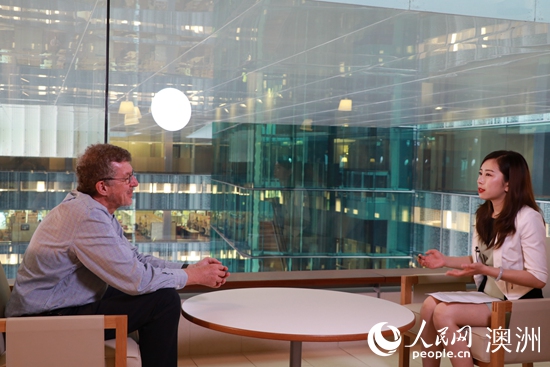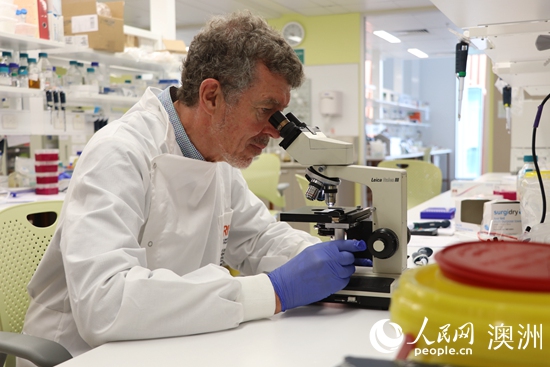

As the second commonest cancer in the world, cervical cancer is causing more than 250,000 women to death every year. In China, 130,000 new cases of cervical cancer occur each year. The invention of the cervical cancer vaccine has made a great contribution to the health of human beings.
In 1991, with the joint effort of Professor Ian Fraser and Chinese scientist Dr. Zhou Jian, from the University of Queensland Institute of Immunization and Metabolism, the technology that makes the shell of the virus was completed at the University of Queensland in Brisbane, Australia.
As the co-inventor of the cervical cancer vaccine, Professor Ian Fraser was recognized as “Australian of the Year” in 2006. He was also a recipient of the Prime Ministers Prize for Science, and of the Balzan Prize. In 2018, Professor Fraser was elected as the Corresponding Fellow of the Royal Society of Edinburgh.

Professor Ian Fraser (L) in the interview (People's Daily Online/Li Yanyun)
Born in a medical family in Scotland in the United Kingdom, Professor Frazer was raised in an innovative and creative environment. His father, a doctor, and pathologist is one of the world's first pathologists who started to use computers in pathology laboratories and kidney dialysis rooms. His mother, also a scientist, specializes in the effects of diabetes on human nerves. Since childhood, Professor Frazer has expressed strong curiosity in the relationship between the universe and human beings. With the dream of becoming an astrophysicist, he received his Bachelor Degree in Physics at the University of Edinburgh in 1974.
"I hope to explore the world and figure out the laws of everything in the world, but there are too few physics experiments. I found that I am more suitable for medicine. My parents have said that they support my dream of becoming an astrophysicist. But when I found the real area that suited me, I realized that they actually wanted me to become a medical worker.”
In 1977, Professor Frazer started his career as a kidney doctor in Edinburgh. In 1980, he began a five-year study of pathology at the Walter and Eliza Hall Medical Institute in Melbourne, Australia. In 1985, he became a lecturer at the University of Queensland and established a laboratory to study viral infections. Since then, he has been working on immunology for more than 30 years.

Professor Ian Fraser is doing an experiment in the lab (People's Daily Online/Li Yanyun)
It was in 1989 when Professor Frazer met with Dr. Zhou Jian, a Chinese friend who changed his life. While he was in Cambridge on sabbatical working on papillomavirus, a couple from China moved to the lab next door for their research. “The first time I met with Zhou Jian and Xiaoyi in Cambridge, they were working really hard. I was really touched because they were working no matter on weekdays or weekends,” he said.
With the same dream and love for science, the two young guys clicked and became good friends in Cambridge. Invited by Professor Frazer, Dr. Zhou Jian and his wife Sun Xiaoyi to Australia and started their research on cervical cancer. What they didn’t know was that, a few years later, they became the father of the cervical cancer vaccine and helped millions of women worldwide.
“We have complementary skills. I was an immunologist interested in virus from a point of view about how the body fights off the virus. Jian was a molecular virologist and he was interested in how the virus worked. That was why the partnership works so well because each of us brought the different bits to the table. We built trust because we understood each other.”
The first and most difficult task in developing a cervical cancer vaccine is to synthesize the HPV virus (human papillomavirus). The virus dies immediately after leaving a living cell body and makes it impossible to be extracted. Dr. Zhou Jian and his wife finally came up with the idea of artificially synthesizing HPV virus (human papillomavirus). In 1993, the immune response was proven effective in animal experiments. In 2006, cervical cancer vaccine was first approved for marketing in Australia. A year later, more than 80 countries around the world began using cervical cancer vaccines.
However, in 1999, during an academic visit back to China, Dr. Zhou Jian passed away unexpectedly. "It was obviously very hard for me. Jian is not only my colleague and friend, but he also made a great contribution to the research of the cervical cancer vaccine."
Engaged in medical research for more than 40 years, Professor Frazer felt that working with Chinese scientists and Chinese companies is the best choice due to the country’s rapid development in the past few decades. In 2018, he started working with a medical institution in Shenzhen to develop a research report on cervical cancer therapeutic vaccines. 25 years have passed since his first visit to China with Dr. Zhou Jian and Professor Frazer told us that he witnessed the enormous changes in China.
“They are very different countries. In 1996, Wenzhou was a relatively old city. Now when you go there, it’s like any other city in the world. When the first time I went to China, perhaps the science in China was not as advanced as it is now. But now I think China competes with us. I would imagine by 2050, you will be telling us how to do science.”
“Many of my students are from China. Chinese students and scientists are diligent and hardworking. This is a country that creates talents and fosters innovation. China is the best partner of Australia,” he said.
China officially approved the application of cervical cancer vaccine in 2018. Currently, the vaccine is currently in use in 133 countries and regions around the world. Professor Frazer believes that the cooperation between Australia and China will benefit the whole world. “Chinese are always very willing partners. I think that sciences are global efforts. We don’t do sciences for Australia or do sciences for China; we do sciences for the world. I think the more we can work cooperatively together, the better the outcome is.”

 Award-winning photos show poverty reduction achievements in NE China's Jilin province
Award-winning photos show poverty reduction achievements in NE China's Jilin province People dance to greet advent of New Year in Ameiqituo Town, Guizhou
People dance to greet advent of New Year in Ameiqituo Town, Guizhou Fire brigade in Shanghai holds group wedding
Fire brigade in Shanghai holds group wedding Tourists enjoy ice sculptures in Datan Town, north China
Tourists enjoy ice sculptures in Datan Town, north China Sunset scenery of Dayan Pagoda in Xi'an
Sunset scenery of Dayan Pagoda in Xi'an Tourists have fun at scenic spot in Nanlong Town, NW China
Tourists have fun at scenic spot in Nanlong Town, NW China Harbin attracts tourists by making best use of ice in winter
Harbin attracts tourists by making best use of ice in winter In pics: FIS Alpine Ski Women's World Cup Slalom
In pics: FIS Alpine Ski Women's World Cup Slalom Black-necked cranes rest at reservoir in Lhunzhub County, Lhasa
Black-necked cranes rest at reservoir in Lhunzhub County, Lhasa China's FAST telescope will be available to foreign scientists in April
China's FAST telescope will be available to foreign scientists in April